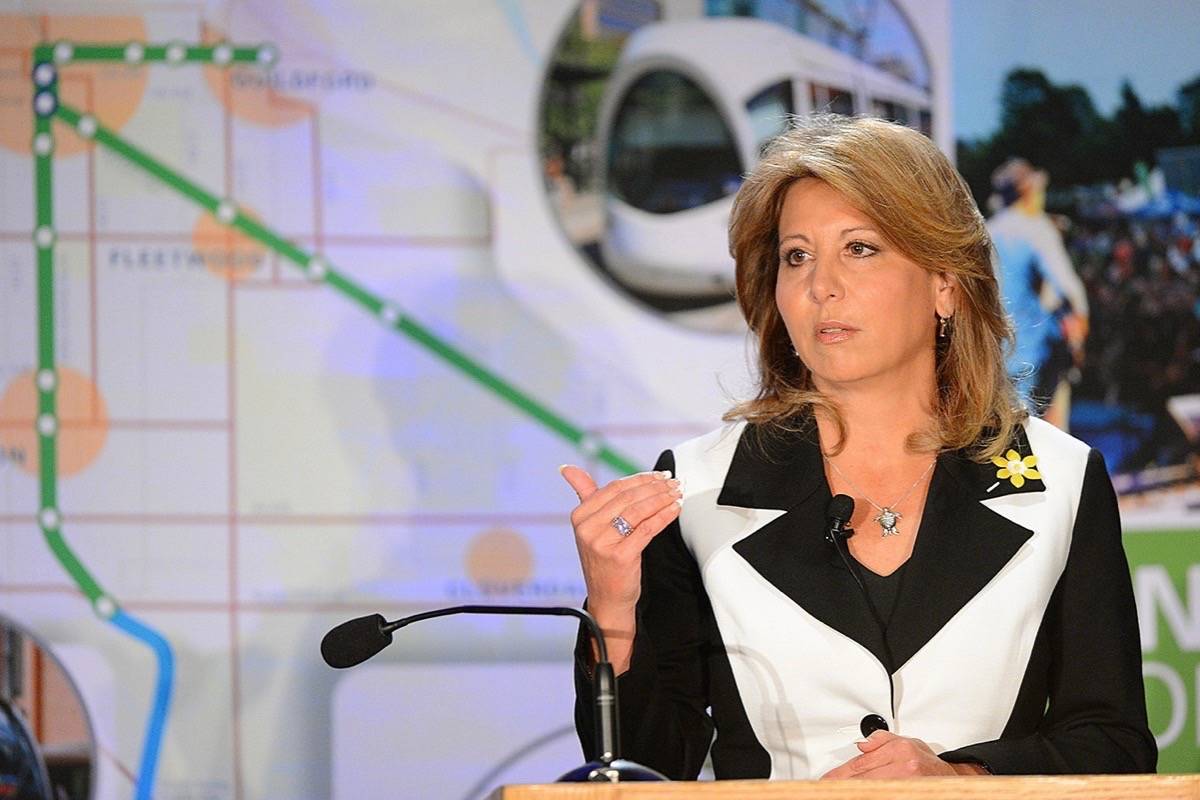BC Liberal leadership candidate Dianne Watts has THIS to say about congestion and mobility pricing:
. . . Watts says the province’s tolling system is “antiquated” and mobility pricing is needed to alleviate congestion on the roads.
“There absolutely needs to be a system in place. Absolutely. And it has to be low,” the former mayor of Surrey told Business In Vancouver on Roundhouse 98.3.
Do note the easy out from Watts — any pricing scheme can be easily criticized as “too high”. Despite this, it does seem a turnaround of sorts is at trial balloon stage from the party formerly in favour, mostly, of HUGE bridges and HUGE roads for EVERYONE!
Thanks to Tyler Orton in Business In Vancouver.














I’m not sure how keeping it low will change behaviour. It shouldn’t be onerous, but needs to be high enough to make people think.
And distance-based.
I thought mobility pricing was only one of several options. It’s being discussed like it’s the only one. Have added gas taxes and bridge tolls/cordons been formally dispelled from Translink’s panel, or just dismissed in the court of public opinion?
Author
The study group is called “The Mobility Pricing Independent Commission”. Exactly what mechanism to recommend is the main question.
https://pricetags.wordpress.com/2017/10/26/mobility-pricing-commission-exploring-new-approaches/
Thank you, Ken. I didn’t know that was the commission’s formal name. It’s a little presumptuous to name it after one of the options, but I’m sure they’re keeping an open mind.
Dan, it is the name of all of the options. It isn’t the distance based road pricing commission.
The problem is that some are suggesting that mobility pricing can only be accomplished with road use pricing.
I understand that is its supposed intent. However, the term “mobility pricing” is often used to refer to distance-based pricing. It is not used to refer to increased gas taxes and/or bridge tolling and cordons.
Mobility pricing is the broader subject.
Distance based road pricing is an option, as are bridge tolls and cordons.
Bus fares are considered a form of mobility pricing, as are fuel taxes.
Gas taxes are declining and avoided, bridge tolls are too limited. The push now is to tax/charge everything that moves. As mentioned above, this could include transit, gas taxes, bicycle permits, and other trails and road tolls.
Sidewalks will probably remain free.
I think the push is to use charges to manage demand, not to tax everything that moves.
Look at variable parking charges (on street) in the City. Leave aside the issue of whether we should devote streets to car storage, just for a moment.
Changes have been made to adjust parking rates upward to achieve a small number of spaces always available, ie encourage increased turnover. At the same time, rates have been adjusted downwards in the evenings when there is no need to have higher rates, there are lots of spaces.
“Manage demand” is just a euphemism for engineer, control or steer demand based on ideology.
“Adjust parking rates upward” is another euphemism for raising prices by targeting drivers of vehicles. This has been decided from an ideological point of view to make those drivers inconvenienced by taxing them more and hoping this will deter them from driving.
Since a comprehensive rapid transit system as an alternative for the Metro Vancouver region is not remotely possible for decades, these policies are blatantly punitive.
Unless politicians can clearly convince the overwhelming majority of the populace, those that have to drive, that it’s not just them that are being taxed and that they will greatly benefit from these new taxes, the schemes will not find majority support.
That would be the ideology of economics.
You skipped over adjusting parking rates down, not surprisingly. Is it an example of an opposing ideology in your mind, or is it simply inconvenient to consider both examples when trying to make your point?
Wobegone is an archaic spelling of woebegone, well suited to one expressing outdated ideas.
It also appears to be a euphemism for our resident bot, eric.
As with the carbon levy (not a tax – yet), I am sure that a road pricing mechanism can be created that will benefit most drivers. If the majority benefit both financially and in reduced trip times, then it should be an easy sell.
No, the ideology is to discourage driving by removing car spaces, throttling traffic using bottlenecks and charging drivers so they pay for transit and other ideologically approved ideas. This is stated policy.
[Ed: comment edited for violation of comment policy]
@ Wobegon / Eric/ Anon / Jen
Expressing opinions is cheap and easy. Doing real research and having an open mind about opposing viewpoints is hard work. An urban equation heavily loaded on one side with asphalt will never balance. The laws of physics and basic geometry always win.
Dianne Watts needs some more mobility for her faltering campaign more than anything.